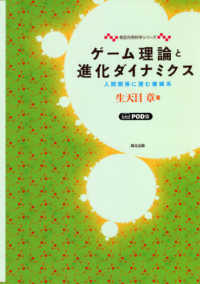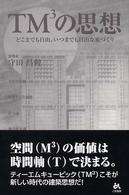- ホーム
- > 洋書
- > ドイツ書
- > Humanities, Arts & Music
- > Music
- > theory of music & music basics
Description
(Text)
How can we define the referential systems by which music is determined and through which music gets its own sense and meaning? What is the relation between these systems? Such questions are of particular weight in relation to current music practices, characterized by a great many analytical procedures and hermeneutical views. The questions raised open a Series of different thematic fields presented in this book. The authors allocate the place of music to the field of aesthetic autonomy or describe its specific sign system(s). Special attention is focused on the systems of musicological contextualization and the meaning/understanding of music in different historical and/or functional contexts, from traditional liturgical chant up to recent compositions. Various contributions in the collection are dedicated to the relation between music and film, while others deal with the special sociological conditions that constitute some specific musical praxis, such as folk or rock music.
(Table of content)
Mário Vieira de Carvalho: Musical Autonomy as a Referential System;Matjaz Barbo: Systems of Values in Diverse Aesthetic Realities;Karmen Salmic Kovacic: The Human Perception of Music: The Most Intricate and Complex Referential System; Ana Petrov: Max Weber's Theory of Music Development: Evolution and Rationalization of Music; Thomas Hochradner: Education of the Masses or The Patient Continuity of a Referential System: Eberhard Preußner's Writings on Music History; Leon Stefanija: Between Nature and Culture: A Note on David Huron's "Musicological Repercussion"; Robert J. Dow: The Referential in Acousmatic Music; Michael Walter: The Change from Cultural Practice to Aesthetic Practice: Gregorian Chant as an Example; Olga Jokic: The Eschatological Meaning of Music and the Eschatological Function of Liturgy: Ernst Bloch's Philosophy and Eschatology of Orthodox Christianity; Katarina Bogunovic Hocevar: The Musical-Historical Concept of Romanticism: A Scientifically Applicable Label? Gregor Pompe: The Question of Referential Frameworks in Wagner's Music Dramas; Srdan Atanasovski: Schoenberg and the Overtones: Evolving the Ear, Shaping the History; Lubomír Spurný: Yesterday's Art, Tomorrow's World; Nico Schüler: The Music of Hanning Schröder (1896-1987): Between Autonomy and Function and Between Twelve-Tone Technique and New Objectivity; Igor Radeta: Symbols of Faith in Metaliturgical Discourse: The Case of Messiaen; Cheong Wai Ling: Culture as Reference in the "Gagaku" of Messiaen's Sept Haïkaï; Larisa Vrhunc: "Spectral" Aspects in Neville Hall's Compositional Thinking; Anna Gadzinski: Film Music beyond Stigmatisation with Effects; Maja Vasiljevic: How Not to Turn Film Music into a Musical Work: Towards Sociological Approach to Film Music; Tjasa Ribizel: RTV Slovenia Symphony Orchestra's Management from 1955 to 1963; Milica Simic: Folk Music on Radio Belgrade: A Turning Point in Folk Music Singing and Recording Practice on the Serbian National Broadcaster; Jelena Arnautovic: Rock Music as an Alternative Space in Serbia during the Sixties: The Case of Radio Belgrade; Julijana Zhabeva-Papazova: Alternative Music in Yugoslavia in the 1980's and the Concept of its Ideology;








